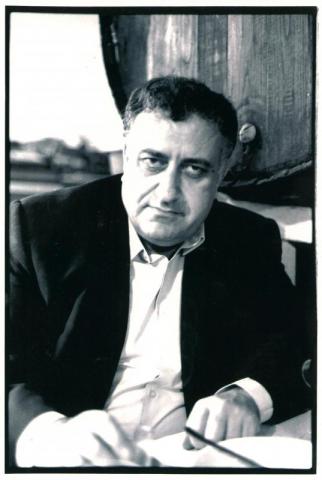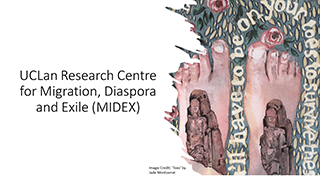Geramanis Panos

Geramanis, Panagiotis (Panos) (Vasiliko Halkida, 17 December 1945 – Parga Preveza, 30 April 2005), Journalist – researcher – student of folk music.Attended secondary school (gymnasion) in Halkida, and in Vasiliko. He was awarded a diploma from Omiros, then the country’s only school of journalism, He was actively engaged in journalism from the age of 16, as correspondent in Halkida for the newspapers Eleftheros, Omada and Phos. His first reports were of the Lelas Vasiliko football games; he later reported on the Olympiakos Halkida team which in 1963 played in the top national league.
To Eleftheros (weekly political newspaper), he sent reports (1963-1964) of the agrarian and social issues of the day. During his last two years as a secondary school student, in addition to the reports he sent to Athenian newspapers from Halkida, he developed parallel activity on the newspaper Phos ton spor in Athens where, as a permanent (and paid) correspondent, in addition to sports reporting, he also made his appearance in art-related matters. At the age of 17, he was given an exclusive interview for Fos ton spor by the celebrated Greek singer Stelios Kazantzidis. During the same period, he began his collaboration with the monthly magazine Football. He was the only reporter trusted by the singer, who gave him a total of 56 interviews between 1963 and 2001, when Kazantzidis died. He gave even his final interview to Geramanis, just a few months before the end; it was published in the newspaper Ta Nea in 2001.
In secondary school in Vasiliko, in 1963, he published the newspaper Mathitikos Faros (Pupils’ Lighthouse) by himself. In 1964, he put out the newspaper Agrotiki Foni (Farmer’s Voice) in Halkida. From 1965 to 1967 he did his compulsory military service in Athens, where he was given the opportunity to conduct parallel activities in journalism. He worked on Phos, Super-Spor and Athlitika Chronika and also collaborated with the sports section of the newspaper Apogevmatini and with the magazine Proto. During his military service he worked at the Armed Forces’ radio station where he was a sports announcer. His discharge from the army in March 1967 put him in a very difficult position, since a month later the Colonels imposed a military dictatorship on the country; their censorship closed nine out of the 16 daily political newspapers.
Between 1967-1970, he worked on Super Spor, Protathlima, Vima ton Angelion, and Panathinaika Nea. In 1970 he collaborated with the sports section of Apogevmatini. At the same time he was studying at the Omiros School of Journalism and began working in the provincial section of the newspaper Akropolis. As long as the dictatorship lasted, Geramanis communicated by telephone with composer Mikis Theodorakis, who was then living abroad, and who trusted him, and over a period of two years (1972-1974) gave him 17 political-artistic interviews forAkropolis and Apogevmatini.
In Akropolis, Geramanis was soon promoted to free social and police reporting; for a year (1973) he covered shipping news and Piraeus, and after the junta was removed, took up court reporting to cover (with another two colleagues) the Court of Appeal hearings regarding the men who led the dictatorship and caused the Polytechneion incidents, and later the hearings at the court martial of the military torturers.
In 1975, he did some revealing research: “Athens in the thrall of narcotics”, “Sale of infants” and “Godfathers of the night”. For these successes, he received an award of 50,000 drachmas from Akropolis at a public event held in January 1976. Between 1977 and 1981, he worked as a staff text editor on the same newspaper. In 1981, Panos Geramanis was one of five reporters who joined Alexandros Philippopoulos in resurrecting the newspaperEthnos. This small team of journalists played a leading role in establishing new technologies (tabloid format, phototypesetting and colour). He worked on Ethnos, as the assistant chief editor until 1986. From 1982 on he worked as chief editor of the magazine Hellenosovietika Chronika. He contributed to the magazine Defi. For a while in 1986, he worked for the newspaper Proti and from June 1986 to November 1987, he was responsible for the content of the daily newspaper Kerdos. From November of 1987 until April 2005, he worked on the newspaper Ta Nea, where he covered cultural issues. Every Saturday, in his column “Remember” in the pages of Omada, he reminded the younger generation of the old glories of football. He loved football and of course his team, Olympiakos, and its song.
In 1987 he received the state prize for travel literature for his book entitled Reporting from Siberia (1986) in Greek. He published two Greek-language biographies of singers: the first entitled Stelios Kazantzidis: When a voice becomes a legend; Diary of honour (2000) and later one about Grigoris Bithikotsis “I, Sir…” His great longing was to write a book about everything he had seen throughout his 38 years of friendship with Stelios Kazantzidis. But time ran out; he didn’t even make it to his first television program entitled “Juke Box” about popular music, the proposal for which he had prepared for the public channel ERT.
Together his passion for printed journalism, Geramanis had also acquired a great new passion, radio. He was first heard on the radio in February of 1989 on the newly established radio station 902 Left on FM, with the “Microphone for a song” (Sunday midday) initially and then later, with his program “For the night people” (evening).
Starting in March of 1990, he worked with the state radio. On the Second Programme (ER – 2) he regularly presented the daily programme “Popular Bards” on which more than 220 singers of popular music were heard, starting with 10 special programs devoted to Stelios Kazantzidis, and then to Grigoris Bithikotsis. In June 1994 he began to present programmes entitled “Aces of the fields” every Saturday and Sunday on ERA-SPORT. And every Thursday evening in the 10-midnight spot, he had an open line with Greeks all over the world on ERA’s Fifth Programme through the “Voice of Greece”.
The programme “Popular Bards” was incorporated in the form of seminars into the programme of the State University of Paris for students in their final year of Media Studies, as one of the best radio programmes in Europe about folklore, customs and national culture.
On 15 December 1999, Geramanis was awarded the highest journalistic distinction, the Botsis prize for his 33-year service to journalism and for his programmes about popular music and sports on the state radio (he received the award from the then President of the Republic, Kostis Stephanopoulos). In 2002, the municipality of Lilantia Evia honoured him and in 2004, on the initiative of the then president of ERT Angelos Stagos, he received the state radio award for his programme “Popular Bards” which was celebrating its 15th anniversary on the air.
He was elected president of the First Instance Disciplinary Council of Journalists' Union of Athens Daily Press (ESIEA) and is a member and vice-president of the Popular Song Association.
Two months before he died, he gathered together some of the texts he had at home about the people involved in popular music and took them to Kastaniotis, the publishing house. He himself had given a list of the interviews and portraits he wanted to be included in his book My life a song to his friend and colleague Vasilis Loubrinis, who completed it, It was published by Kastaniotis in 2007 after Panos Geramanis’ death.
BOOKS (all in Greek): Reporting from Siberia (1986), Stelios Kazantzidis. When the voice becomes a legend: Diary of honour, Angyra, 2000. Grigoris Bithikotsis, I, Sir…, Panos Geramanis (ed.) Kochlias, 2002.
BIBLIOGRAPHY (all in Greek): Panos Geramanis, My life is a song, Vasilis Loubrinis (ed.); Lefteris Papadopoulos (preface), Kastaniotis, 2007; Vasilis Kardasis, Panos Geramanis: On popular paths, Angyra, 2010.
Vasilis Loubrinis






